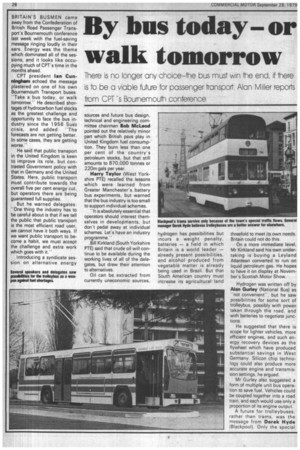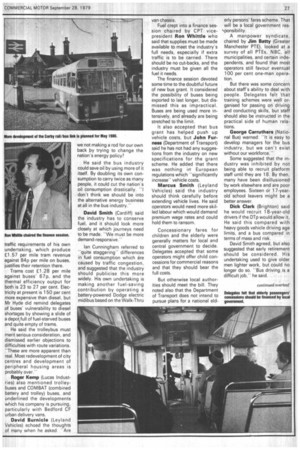By bus today-or walk tomorrow
Page 28

Page 29

If you've noticed an error in this article please click here to report it so we can fix it.
nere is no longer any choice-the bus must win the end, if there is to be a viable future for passenger transport. Alan Miller reports from CPT "s Bournemouth conference
BRITAIN'S BUSMEN came away from the Confederation of British Road Passenger Transport's Bournemouth conference last week with the fuel-saving message ringing loudly in their ears. Energy was the theme which dominated all of the sessions, and it looks like occupying much of CPT's time in the months ahead.
CPT president Ian Cunningham echoed the message plastered on one of his own Bournemouth Transport buses "Take a bus today, or walk tomorrow.He described shortages of hydrocarbon fuel stocks as the greatest challenge and opportunity to face the bus industry since the 1956 Suez crisis, and added. "The forecasts are not getting better. In some cases, they are getting worse."
He said that public transport in the United Kingdom is keen to improve its role, but contrasted Government policy with that in Germany and the United States. Here, public transport must contribute towards the overall five per cent energy cut, but operators there are being guaranteed full supplies.
But he warned delegates -One thing the industry has to be careful about is that if we tell the public that public transport is the most efficient road user, we cannot have it both ways. If we want public transport to become a habit, we must accept the challenge and extra work which goes with it."
Introducing a syndicate session on alternative energy sources and future bus design, technical and engineering committee chairman Bob McLeod pointed out the relatively minor part which British psvs play in United Kingdom fuel consumption. They burn less than one per cent of the country's petroleum stocks, but that still amounts to 870,000 tonnes or 220m gals per year.
Harry Taylor (West Yorkshire PTE) recalled the lessons which were learned from Greater Manchester's battery bus experiments, but warned that the bus industry is too small to support individual schemes.
"It is absolutely essential that operators should interest themselves in developments, but don't pedal away at individual schemes. Let's have an industry programme.
Bill Kirkland (South Yorkshire PTE) said that crude oil will continue to be available during the working lives of all of the delegates, but drew their attention to alternatives.
Oil can be extracted from currently uneconomic sources, hydrogen has possibilities but incurs a weight penalty, batteries — a field in which Britain is a world leader — already present possibilities, and alcohol produced from vegetable matter is already being used in Brazil. But that South American country must increase its agricultural land threefold to meet its own needs. Britain could not do this.
On a more immediate level, Mr Kirkland said his own undertaking is buying a Leyland Atlantean converted to run on liquid petroleum gas. He hopes to have it on display at November's Scottish Motor Show.
Hydrogen was written off by Alan Gurley (National Bus) as "not convenient", but he saw possibilities for some sort of trolleybus, possibly with power taken through the road, and with batteries to negotiate junctions.
He suggested that there is scope for lighter vehicles, more efficient engines, and such energy recovery devices as the flywheel which have produced substantial savings in West Germany. Silicon chip technology could also produce more accurate engine and transmission settings, he argued.
Mr Gurley also suggested a form of multiple unit bus operation to save fuel. Vehicles could be coupled together into a road train, and each would use only a proportion of its engine output.
A future for trolleybuses, rather than trams, was the message from Derek Hyde (Blackpool). Only the special traffic requirements of his own undertaking, which produce £1 .57 per mile tram revenue against 84p per mile on buses, justifies their retention there.
Trams cost £1.28 per mile against buses' 67p, and the thermal efficiency output for both is 23 to 27 per cent. Electricity at present is 150 per cent more expensive than diesel, but Mr Hyde did remind delegates of buses' vulnerability to diesel shortages by showing a slide of a depot full of fuel-starved buses and quite empty of trams.
He said the trolleybus must merit serious consideration, and dismissed earlier objections to difficulties with route variations. -These are more apparent than real. Most redevelopment of city centres and development of peripheral housing areas is probably over."
Roger Kemp (Lucas Industries) also mentioned trolleybuses and COMBAT (combined battery and trolley) buses, and underlined the developments which his company is pursuing, particularly with Bedford CF urban delivery vans.
David Burnicle (Leyland Vehicles) echoed the thoughts of many when he asked "Are we not making a rod for our own back by trying to change the nation's energy policy?
He said the bus industry could save oil by using more of it itself, By doubling its own consumption to carry twice as many people, it could cut the nation's oil consumption drastically. "I don't think we should be into the alternative energy business at all in the bus industry."
David Smith (Cardiff) said the industry has to conserve fuel, and it should look more closely at which journeys need to be made. "We must be more demand-responsive."
Ian Cunningham referred to "quite staggering" differences in fuel consumption which are caused by traffic congestion, and suggested that the industry should publicise this more widely. His own undertaking is making another fuel-saving contribution by operating a battery-powered Dodge electric midibus based on the Walk-Thru van chassis.
Fuel crept into a finance session chaired by CPT vicepresident Ron Whittle who said that supplies must be made available to meet the industry's full needs, especially if extra traffic is to be carried. There should be no cut-backs, and the industry must be given all the fuel it needs.
The finance session devoted sometime to the doubtful future of new bus grant. It considered the possibility of buses being exported to last longer, but dismissed this as impractical. Buses are being used more intensively, and already are being stretched to the limit.
It also accepted that bus grant has helped push up vehicle costs, but John Furness (Department of Transport) said he has not had any suggestions from the industry on new specifications for the grant scheme. He added that there was nothing in European regulations which "significantly increasevehicle costs.
Marcus Smith (Leyland Vehicles) said the industry should think carefully before extending vehicle lives. He said operators would need more skilled labour which would demand premium wage rates and could hold them to ransom.
Concessionary fares for children and the elderly were generally matters for local and central government to decide. Delegates accepted that some operators might offer child concessions for commercial reasons and that they should bear the full costs.
But otherwise local authorities should meet the bill, They noted also that the Department of Transport does not intend to pursue plans for a national eld erly persons' fares scheme. That will be a local government resvonsibility.
A manpower syndicate, chaired by Jim Batty (Greater Manchester PTE), looked at a survey of all PTEs, NBC, all municipalities, and certain independents, and found that most operators still favour eventual 100 per cent one-man operation.
But there was some concern about staff's ability to deal with people. Delegates felt that training schemes were well organised for passing on driving and conducting skills, but staff should also be instructed in the practical side of human relations.
George Carruthers (National Bus) warned: "It is easy to develop managers for the bus industry, but we can't exist without our workforce."
Some suggested that the industry was inhibited by not being able to recruit platform staff until they are 18, By then, many have been disillusioned by work elsewhere and are poor employees. Sixteen or 17-yearold school leavers might be a better answer.
Dick Clark (Brighton) said he would recruit 18-year-old drivers if the DTp would allow it. He said this compared with heavy goods vehicle driving age limits, and a bus compared in • terms of mass and risk.
David Smith agreed, but also suggested that early retirement should be considered. His undertaking used to give older men lighter work, but could no longer do so. "Bus driving is a difficult job," he said.




























































































































































